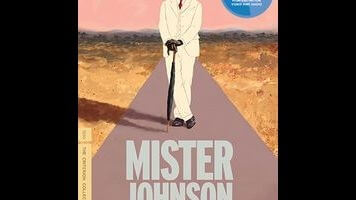If nothing else, let’s give the guy some credit for following up his biggest Hollywood success with a movie that takes place entirely in Nigeria. (For contrast, the film Beresford made just before Miss Daisy was a dopey rom-com called Her Alibi, starring Tom Selleck and model Paulina Porizkova.) Adapted from the 1939 novel by Joyce Cary, Mister Johnson concerns a young Nigerian man of that name (Maynard Eziashi) who works as a clerk for the British civil service. (His first name is never spoken.) Johnson identifies entirely and rabidly with England, and spends much of his time being as obsequious as humanly possible to his boss, Harry Rudbeck (Pierce Brosnan, in one of his first notable big-screen roles; he was primarily known for the TV series Remington Steele at the time). But he’s also an inveterate schemer, and his various exploits get him into serious trouble—first when he encourages Rudbeck to misappropriate funds in order to build a much-needed road from the town to the main highway, and later when he repeatedly clashes with another British officer, Sargy Gollup (Edward Woodward), who treats him like a small child.
It must be said that some readers of the novel feel that Cary treats Mister Johnson like a small child, too. The book has been both highly popular and somewhat controversial over the years, and it’s certainly possible to feel a bit uncomfortable about the notion of a white author telling the story of a Nigerian who reveres everything to do with England and commits multiple major crimes. As played by Eziashi (who had never acted in a movie before), however, Johnson comes across on screen as gratifyingly complex—both a scoundrel and a hero, often at the same time. His unfailing optimism, even in the bleakest circumstances, makes him nearly impossible to dislike, no matter what sort of chicanery he’s employing or advocating. At the same time, he’s not afraid to stand up for himself when necessary, and the scene in which he punches a drunken, abusive Gollup complicates any view of him as a simpleton in thrall to his colonial oppressors.
Ultimately, Mister Johnson concerns the relationship between Johnson and Rudbeck, with the latter’s attitude toward the former evolving from exasperated tolerance to friendship and respect. Their final scene together, in particular, earns the pathos for which it strives, though Beresford can’t leave well enough alone and chooses to conclude with a maudlin montage of random people going about their oblivious business, supplemented by a shot of sunlight peeking through tree leaves. (Life goes on. We get it, Bruce.) Why Criterion chose to resuscitate this particular film alongside Breaker Morant isn’t clear, especially since the film Beresford made next, Black Robe (1991)—set in 17th-century Quebec—is among his very best. Still, it’s a stronger picture than cinema history perhaps recalls, and welcome evidence that the director of 1989’s alleged Best Picture, though ignored by the Oscars, deserves some attention.

 Keep scrolling for more great stories.
Keep scrolling for more great stories.
